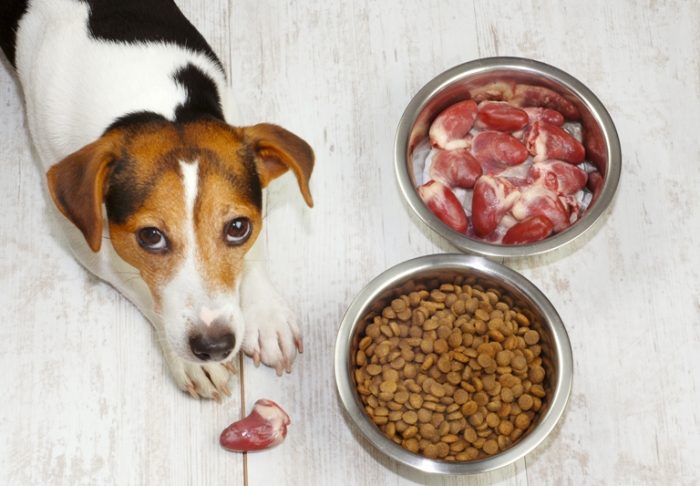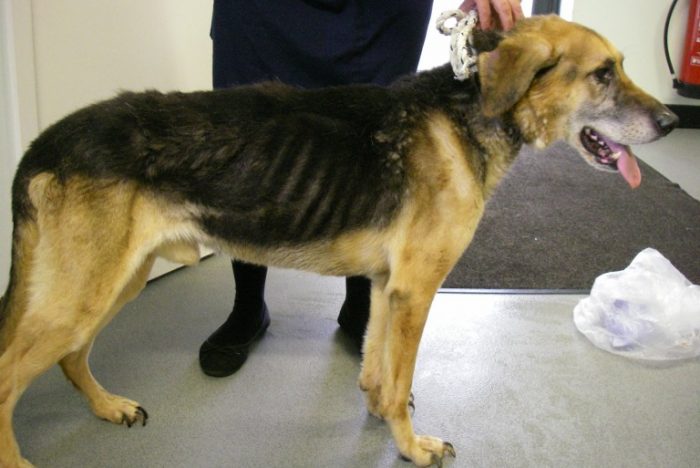When it has to do with body weight, dogs are comparable to humans. Though they are more likely to suffer from overweight than underweight, several conditions abound, which can leave your canine chum in need of high-calorie dog food. The good news is that we have a wide variety of canine foods, as well as supplements that can aid dog parents in improving their pet’s weight. In view of this, we will be educating pet adopters on how to know when their furry friend is underweight, the possible reasons for weight loss, and the right diet and supplements to feed a skinny dog.
Table of Contents
How to Know Your Dog is Underweight
Scales are not necessary for us to know whether our canine friends are doing well weight-wise. To keep your pooch’s tail wagging, these body checks can be administered with loads of affection.
Feel the ribs
Get your canine chum in a standing position and proceed to run both hands over its sides. Your dog is overweight if too much fat is observed, or you can’t feel the ribs at all because of excess flesh between the skin and the ribs. On the other hand, underweight dogs are the ones that have too many ribs exposed when standing, even without applying the hand test, the ribs are just visible. When you do apply the hand test, nothing much will be felt between the skin and the ribs.
Feel the spine
A similar test can be carried out on your pooch’s spine, a gentle run of the hands over its back will confirm whether the dog is overweight or underweight. Though the spine bones are not expected to protrude, you should be able to feel them. A dog is considered overweight when the bones appear to be buried under considerable fat. An underweight dog is one with a well-pronounced spine; besides, little or no flesh will be felt on each vertebra – this is where high-calorie dog food will come in handy.
Other signs to indicate a canine’s body condition include a contour that goes inwards after the dog’s rib cage or a nice tuck right under its waist.
Possible Reasons Your Dog is Underweight
If you have an underweight dog, there may be several underlying reasons for the weight loss. More often than not, canines that are adopted from an unhealthy previous life or unkempt environment may already suffer from weight deficiencies. If you observe that your furry friend continues to lose weight even when you believe that everything is in order with its diet (you are feeding it with high-calorie dog food), then one of these reasons may be responsible;
Insufficient Diet
If the diet that you offer your pooch is insufficient for the dog’s daily dietary needs, like feeding a large breed canine with food meant for a small breed dog, it could result in being underweight. In the same vein, if you are going on a raw food diet or home-cooked diet, it may be possible that you are inadvertently leaving out a few vital nutritional requirements for weight gain.
Underfeeding
A skinny dog may be an indication that the furry fellow is not getting enough food per meal, or is not being fed enough times daily. Talk to your local vet to know the right quantity of food to give your canine friend, as well as how often.
Parasites
A pup can be prevented from gaining necessary weight by parasites like worms that invade its gastrointestinal organs. If an intestinal worm is a culprit, your pooch may manifest other symptoms like bloating.
Diabetes
Another good reason why dogs are underweight is diabetes. The shortage of insulin in a dog means that it isn’t getting the necessary nourishment out of the cells, leaving the energy to emanate from muscles and fats. However, in this case, a vet has to be consulted before feeding a diabetic dog with high-calorie dog food.
Teeth Conditions
A dog can be put off its food if it suffers from painful teeth like gum inflammation or abscessed gum. Likewise, painful chewing may result from a dog having a painful jaw or sore jaw muscles. Even in humans, when such conditions occur, eating becomes an unpleasant thing to do, leading to weight loss.
Diseases
Among the diseases that can result in being underweight in dogs are cancer, abdominal disorders, pulmonary conditions, and many more health challenges that can lead to a dog having trouble keeping its body weight balanced. Most of the time, the resultant effect of the health conditions causes loss of appetite which in turn leads to weight loss.
Medications
A dog can lose weight as a result of side effects from certain medications, and gaining back the lost weight may not be easy. In such a situation, the vet can be consulted for a possible change of the pup’s prescription.
What Kind of Food is Vital For Malnourished Pups?
When choosing the right food for your canine chum, your focus should always be on certain nutritional needs. With dogs that are underweight, the food quality will likely have a deeper impact than what is normal, especially when they are high-calorie dog food.
Proteins

When a dog is underweight, the need for high-quality proteinous foods becomes greater. With this condition, it is even more important for their source of protein to come from meat, which will be easier for the dog to digest. In addition to needing to absorb as many essential nutrients as possible, the right diet must be made available, and remember that the dog won’t be benefiting from all the extra energy it will expend on poor digestion.
You must apply caution when feeding grains to an underweight dog. Many dogs don’t usually process corn and wheat efficiently, and you should be wary of wheat allergies. Any dog that is left to extract all of its proteins out of complex carbohydrates is likely to fall behind in its caloric needs.
Excellent sources of protein for your pup include duck, beef meal, lamb, venison meal, chicken, as well as chicken meal. When it is necessary, a dog can always utilize accumulated protein for fuel.
Dietary protein has its primary role in the development and growth of muscles and tissues, as well as the maintenance of a dog’s daily function.
Fats
When feeding a dog to gain weight, many dog adopters tend to focus on protein. Though protein is quite important, calories that come from fats will more likely provide the needed power for your furry companion’s ramped-up metabolism. For underweight pups, quality protein and moderately high-fat canine food are necessary.
Sources of high-quality fats include meat, fish, egg, and seafood sources. Get fish oil, fish or salmon meal, and mussels. Coconut oil happens to be the single plant exception that your four-legged buddy may benefit from. With its medium-chain triglycerides, coconut oil is easily absorbable by numerous species, dogs inclusive.
Carbohydrates
For a dog that is still struggling to put on some weight, carbs should be limited as much as possible. Compared to carbohydrates, the canine population is better prepared to process the fats for their fuel. Also, you must consider some recommended fruits and veggies – these are replete with antioxidants that are vital for your dog’s wellbeing and are indispensable for its healthy metabolism as well.
Read also: Dog Blow Dryer: The best ways to dry a wet dog
Probiotics
The importance of probiotic cultures in balancing the canine intestinal bacteria or flora cannot be overemphasized – this makes for easy digestion and absorption of nutrients. Another importance of digestive balance is that it aids in reducing the effects of weight loss emanating from diarrhea. The benefits of prebiotics in the canine diet are now being proclaimed by nutritionists.
Vitamins and Minerals
With the right vitamins and minerals, your pooch will be functioning optimally at a cellular level to maximize the absorption of nutrients, as well as its metabolism for muscle mass.
High-Calorie Dog Food to Give to Underweight Dogs
The recommended high-calorie dog food to feed your canine companion includes:
- Ziwi Peak New Zealand Beef Recipe Canned food
- Taste of the Wild High Prairie Grain_Free Diet
- Nature’s Variety Instinct Raw Boost Senior Recipe
- Purina Pro Plan SPORT Formula Dry Dog Food
- Wellness Core RawRev Grain-free Dog Food
